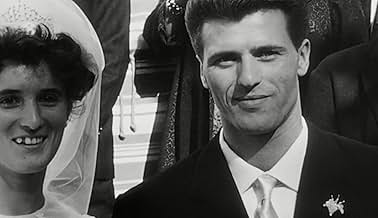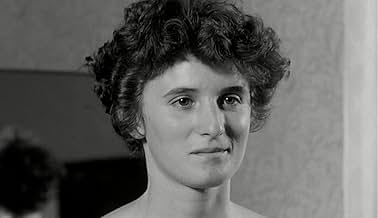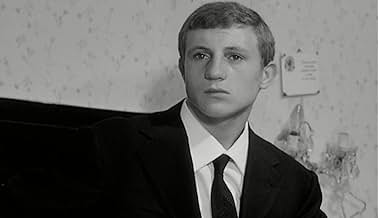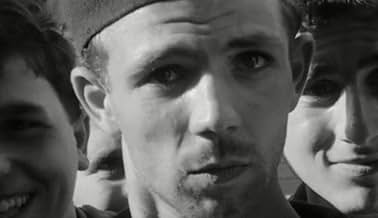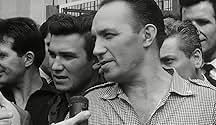IMDb-BEWERTUNG
7,5/10
2810
IHRE BEWERTUNG
Füge eine Handlung in deiner Sprache hinzuDirector Pasolini traverses Italy in 1963 with camera and microphone interviewing people in public places about sex, marriage and gender roles.Director Pasolini traverses Italy in 1963 with camera and microphone interviewing people in public places about sex, marriage and gender roles.Director Pasolini traverses Italy in 1963 with camera and microphone interviewing people in public places about sex, marriage and gender roles.
Lello Bersani
- Narrator
- (Synchronisation)
Io Appolloni
- Self - Girl at Lido with Swimming Cap
- (Nicht genannt)
Graziella Chiarcossi
- Graziella the Bride
- (Nicht genannt)
Graziella Granata
- Self - Girl at Lido with Long Hair
- (Nicht genannt)
Pier Paolo Pasolini
- Self - Interviewer
- (Nicht genannt)
Empfohlene Bewertungen
I too was disappointed, but not for the reasons cited in the previous comment.
Instead, I found the film very hard to follow, with lots of academic buzzwords (interviewer Pasolini refers to "the sex problem" at least 20 times), not all of it subtitled, and subtitles that faded out of legibility against light backgrounds.
The movie was visually unappetizing, in part because of inconsistent and often inept camera work, and in part because of a sloppy transfer to tape that washed out the middle tones and often made it hard to see and read people's faces.
The most annoying element was the recurrent muting of the voice tracks (and of course the accompanying sub-titles) that was labeled "self-censorship." Was this a comment on official censorship of the time? I get the impression that the most interesting answers were lost to the audience through this process.
An interesting and meaty idea from a provocative and often great filmmaker, undercut by directorial inexperience and poor repackaging.
Instead, I found the film very hard to follow, with lots of academic buzzwords (interviewer Pasolini refers to "the sex problem" at least 20 times), not all of it subtitled, and subtitles that faded out of legibility against light backgrounds.
The movie was visually unappetizing, in part because of inconsistent and often inept camera work, and in part because of a sloppy transfer to tape that washed out the middle tones and often made it hard to see and read people's faces.
The most annoying element was the recurrent muting of the voice tracks (and of course the accompanying sub-titles) that was labeled "self-censorship." Was this a comment on official censorship of the time? I get the impression that the most interesting answers were lost to the audience through this process.
An interesting and meaty idea from a provocative and often great filmmaker, undercut by directorial inexperience and poor repackaging.
At first sigh, social portrait. Pier Paolo Pasolini across Italy , talking with large categories of people about not very comfortable themes. Their answers, the crowd, the familiar names from Antonella Lualdi and Oriana Falacci to Alberto Moravia, Cesare Musatti or Giuseppe Ungaretti interventions and the answers, genuine, innocent, in few cases hypocritics of people and the discover of powerful tradition defining rules of life, the difference, real profound, betwen South and North of Italy, the silence of middle class , the laws and the essence of a special world. Sure, in my case, the name of director/ interwiever was the basic/ fundamental kick for not ignore this documentary. The prize - the high honesty, the humor, smiles, reactions, laugh, shame, reactions, the manner to explore the one front of him by Pasolini, the crumbs of nostalgia, the memories about pasolinian textes. So, a large slice of life, provocative, in same measure, yesterday and today and, in my case, just fascinating.
Pasolini filmed this documentary in 1963, looking for an account of sexual life in Italy at a turning point in history. He travels south and north, to towns and countryside, interviewing intellectuals, workers, farmers and kids. The result is a strikingly accurate portrait of diversities in the country, and of inhibitions and problems to talk about a "natural" thing. Between the notable people interviewed, Nobel prize poet Ungaretti, writers Moravia, Cederna, Fallaci, a whole professional football team, and more.
What stroke me more is the great journalistic pace of the documentary, the technique of intermixing different areas of the country, a very clever approach. A great work still "modern" nowadays.
Sadly amusing the part where Pasolini (an homosexual himself) asked common people an opinion about homosexuality receiving answers of total denigration.
What stroke me more is the great journalistic pace of the documentary, the technique of intermixing different areas of the country, a very clever approach. A great work still "modern" nowadays.
Sadly amusing the part where Pasolini (an homosexual himself) asked common people an opinion about homosexuality receiving answers of total denigration.
Pasolini's informal interviews with Italians about sexual matters doesn't make for a perfect study or a perfect documentary, but it does provide an interesting window into the time period, and it was pretty unique as well. The people he talks to seem to provide a pretty good sample, including those from many regions in Italy and across various categories - men/women, old/young, city/rural, college educated/blue collar, and conservative/liberal. As most of his interviews are conducted in big groups and what appear to be impromptu meetings I don't think it was all that scientific, and wondered how many things were left unsaid out of social pressure. However, in the end I felt like people hadn't been shy with expressing their opinions, and a picture was painted of a changing country - the deeply conservative aspects gradually facing inevitable progress.
The questions that Pasolini seemed most concerned with were:
Is sex important? Are young girls as free as young boys? Should a woman be a virgin when she gets married? Does marriage solve the "sexual issue"? What do you think of sexual "abnormality"? (by this he means, argh, homosexuality) Should divorce be legalized in Italy? (it wasn't possible in the country until 1970)
It's a little tough to hear some of the answers, e.g. about how women are inferior and shouldn't be allowed to work or even go out to a café alone, how a woman should be killed if she commits adultery instead of divorced (to lots of jokes and smiles!), or how homosexuals are disgusting and should be "cured." It was also a little tough to hear Pasolini push so much for prostitution, asking young women workers why they don't make a lot more money by selling themselves, not thinking to interview a prostitute about the significant dangers of her profession or the emotions involved with selling one's body. Similarly, he doesn't interview someone who is gay, even with their identity concealed. His questions often reflect the patriarchy and conformity, making it a window into Pasolini in addition to the window into Italy, and I say that knowing his orientation.
I don't fault the film too much for these things because it's reflecting the society in 1964, and I'm happy times have changed. If a documentary was made about values today, I'm certain that when viewed over half a century later we, too, would collectively appear backward (hell, we appear pretty backward even today :). It was also a pleasure to hear answers which were real gems, a lot of times from young women, professing a desire for equality between the sexes, an end to the outmoded double standard, and practicality in allowing divorce. In a couple of places a clear link is formed between poverty and some of the archaic attitudes, which I found fantastic. That included one guy explaining that sexual harassment at work is a problem thusly:
Man on street: "Freedom is conquered through work. In Germany, they work from when they're 12 to old age. ... In Palermo, if a woman goes to work, her brother grabs her and says, 'Where are you off to?' 'To work.' 'You can't go. The boss will harass you.' Do you understand?" Pasolini: "And so you agree that if economic conditions changed in Palermo..." Man on street: "When employers learn how to behave with girls! Only then! When employers are polite towards women."
Pasolini then idiotically says "but the boss can't have sex with one hundred workers," which even if he's playing devil's advocate is a flawed argument in several respects and which leads to a response that goes down the rathole, that yes indeed, here in Sicily one or two women a day could be easily done. These are the kinds of things you put up with in Love Meetings.
The questions that Pasolini seemed most concerned with were:
Is sex important? Are young girls as free as young boys? Should a woman be a virgin when she gets married? Does marriage solve the "sexual issue"? What do you think of sexual "abnormality"? (by this he means, argh, homosexuality) Should divorce be legalized in Italy? (it wasn't possible in the country until 1970)
It's a little tough to hear some of the answers, e.g. about how women are inferior and shouldn't be allowed to work or even go out to a café alone, how a woman should be killed if she commits adultery instead of divorced (to lots of jokes and smiles!), or how homosexuals are disgusting and should be "cured." It was also a little tough to hear Pasolini push so much for prostitution, asking young women workers why they don't make a lot more money by selling themselves, not thinking to interview a prostitute about the significant dangers of her profession or the emotions involved with selling one's body. Similarly, he doesn't interview someone who is gay, even with their identity concealed. His questions often reflect the patriarchy and conformity, making it a window into Pasolini in addition to the window into Italy, and I say that knowing his orientation.
I don't fault the film too much for these things because it's reflecting the society in 1964, and I'm happy times have changed. If a documentary was made about values today, I'm certain that when viewed over half a century later we, too, would collectively appear backward (hell, we appear pretty backward even today :). It was also a pleasure to hear answers which were real gems, a lot of times from young women, professing a desire for equality between the sexes, an end to the outmoded double standard, and practicality in allowing divorce. In a couple of places a clear link is formed between poverty and some of the archaic attitudes, which I found fantastic. That included one guy explaining that sexual harassment at work is a problem thusly:
Man on street: "Freedom is conquered through work. In Germany, they work from when they're 12 to old age. ... In Palermo, if a woman goes to work, her brother grabs her and says, 'Where are you off to?' 'To work.' 'You can't go. The boss will harass you.' Do you understand?" Pasolini: "And so you agree that if economic conditions changed in Palermo..." Man on street: "When employers learn how to behave with girls! Only then! When employers are polite towards women."
Pasolini then idiotically says "but the boss can't have sex with one hundred workers," which even if he's playing devil's advocate is a flawed argument in several respects and which leads to a response that goes down the rathole, that yes indeed, here in Sicily one or two women a day could be easily done. These are the kinds of things you put up with in Love Meetings.
Saw this beautifully preserved/restored print, with subtitles, via YouTube. Pasolini, with his reputation for political and every other form of radicalism, seems inhibited here, even in the discussion segments with Alberto Moravia and Cesare Musatti. The man-and-woman (and children, students)-in-the-street-and-on-the-farm interviews seem dated, probably since the interviews were conducted on the cusp of major changes in marital and family laws, policies, sexual attitudes in Italy and elsewhere. While no groundbreaking documentary, it's still a fascinating document of the time and place. A more daring and cinematically imaginative treatment of similar themes is found in, of course, "I am Curious (Yellow)"(1967) and "I am Curious(Blue)"(1968), directed by Vilgot Sjoman (a former UCLA film student). In those days there were things you could do in Sweden, albeit with censorship problems, that were simply impossible in Italy, period.
Wusstest du schon
- VerbindungenEdited into Lo schermo a tre punte (1995)
Top-Auswahl
Melde dich zum Bewerten an und greife auf die Watchlist für personalisierte Empfehlungen zu.
- How long is Love Meetings?Powered by Alexa
Details
Box Office
- Weltweiter Bruttoertrag
- 2.789 $
- Laufzeit1 Stunde 32 Minuten
- Farbe
- Sound-Mix
- Seitenverhältnis
- 1.85 : 1
Zu dieser Seite beitragen
Bearbeitung vorschlagen oder fehlenden Inhalt hinzufügen

Oberste Lücke
By what name was Das Gastmahl der Liebe (1964) officially released in India in English?
Antwort

